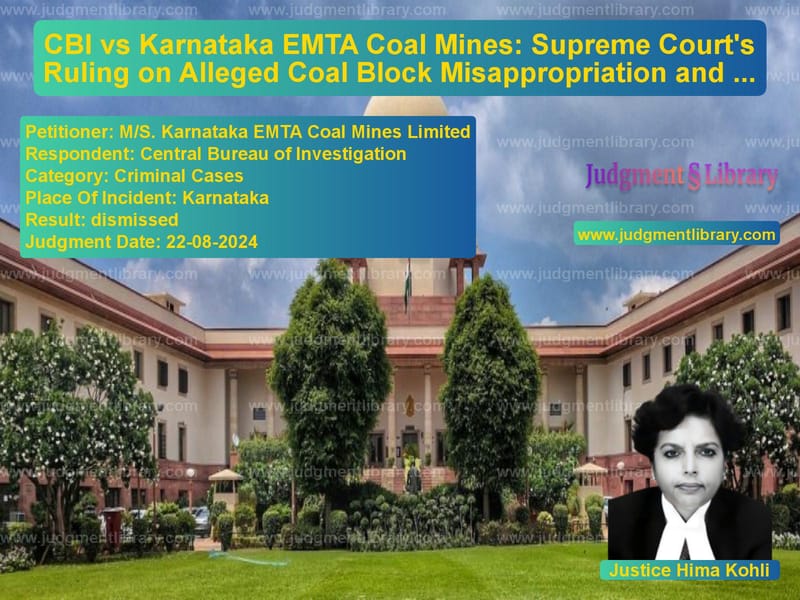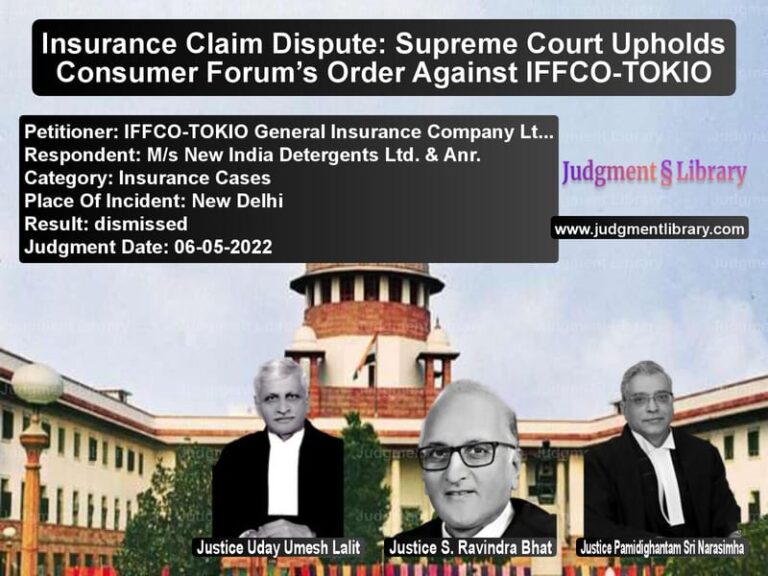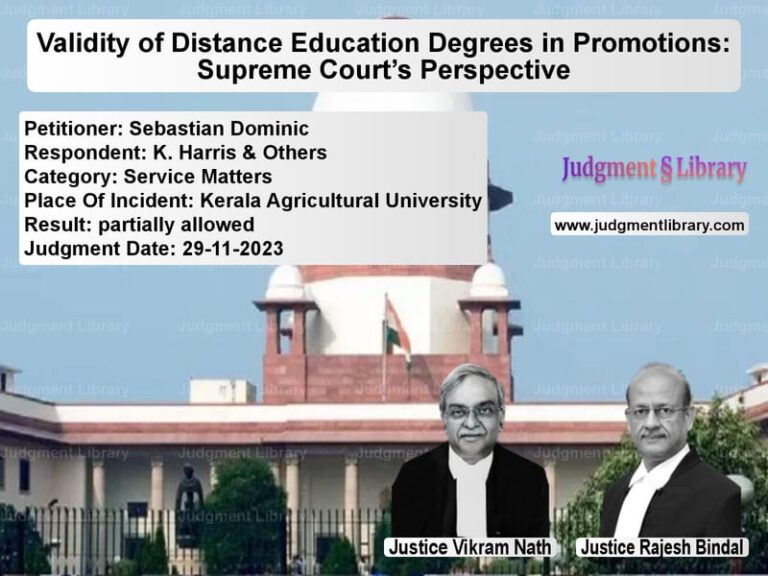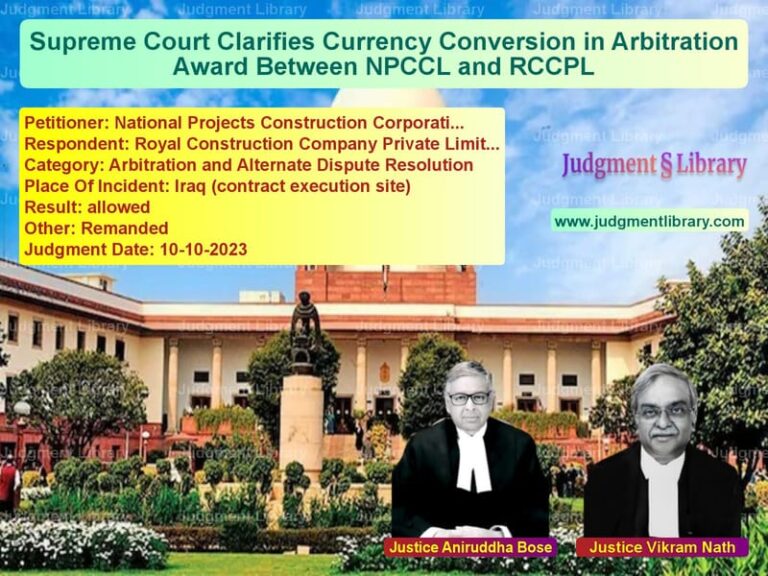CBI vs Karnataka EMTA Coal Mines: Supreme Court’s Ruling on Alleged Coal Block Misappropriation and Legal Implications
The Supreme Court of India recently pronounced its verdict in the case of M/S. Karnataka EMTA Coal Mines Limited vs. Central Bureau of Investigation, a case that revolved around serious allegations of misappropriation of coal rejects and corruption in coal block allocations. This case has been a focal point in discussions surrounding corporate accountability in joint ventures with public sector undertakings and the legal framework governing the disposal of natural resources.
Background of the Case
The case originated from coal block allocations made by the Government of India to Karnataka Power Corporation Limited (KPCL) under the dispensation route. KPCL, a public sector entity, entered into a joint venture agreement with Eastern Mineral and Trading Agency (EMTA), forming Karnataka EMTA Coal Mines Limited (KECML). The joint venture was responsible for extracting coal and supplying it to the Bellary Thermal Power Station for electricity generation.
The Central Bureau of Investigation (CBI) initiated a probe following a report by the Comptroller and Auditor General of India (CAG), which alleged that KECML had misappropriated coal rejects. The report claimed that coal rejects were disposed of in a manner that caused financial losses to the public exchequer. The CBI further alleged that KECML had entered into contracts with private entities to sell these coal rejects without proper authorization.
Legal Issues Raised
- Whether KECML was legally bound to account for and return coal rejects to KPCL.
- Whether the CAG report could serve as a valid basis for initiating criminal proceedings.
- Whether the Karnataka High Court’s ruling, which quashed KPCL’s demand for reimbursement, was final and binding.
- Whether the absence of clear guidelines on coal reject disposal constituted a legal loophole that justified prosecution.
Petitioners’ Arguments
The petitioners, represented by senior legal counsel, presented several key arguments:
- No contractual obligation: KECML argued that neither the Joint Venture Agreement (JVA) nor the Fuel Supply Agreement (FSA) required them to return coal rejects to KPCL. The agreements only mandated the supply of usable coal.
- Negligible calorific value: The petitioners asserted that coal rejects had limited commercial value and were not suitable for electricity generation, negating the allegations of misappropriation.
- CAG report not legally binding: The petitioners argued that the CAG report, which served as the foundation for the CBI’s case, had not been scrutinized or adopted by Parliament. Therefore, it could not serve as conclusive proof of wrongdoing.
- Prior judicial rulings: The petitioners pointed out that the Karnataka High Court had already ruled in favor of KECML, holding that KPCL had no claim over coal rejects.
- Refusal of prosecution sanction: The petitioners emphasized that the refusal to grant sanction for the prosecution of KPCL officials indicated the absence of criminal intent.
Respondents’ Arguments
The CBI, representing the government, countered these claims with the following arguments:
- Public loss due to unauthorized sale: The CBI argued that coal rejects, despite having lower calorific value, were still a saleable commodity, and their unauthorized disposal led to financial losses for KPCL and the government.
- Violation of transparency norms: The CBI contended that the agreement between KECML and Gupta Coalfields and Washeries Limited (GCWL) for selling coal rejects was executed without KPCL’s explicit approval, constituting a violation of transparency norms.
- CAG report as a credible indicator: The CBI maintained that the CAG report provided substantial documentary evidence of financial irregularities, which justified a full-fledged investigation.
- Failure to establish a coal washery: The prosecution argued that KECML had committed a contractual breach by failing to establish a pithead coal washery, which would have ensured efficient utilization of extracted coal.
Supreme Court’s Observations
The Supreme Court carefully examined the submissions from both parties and made the following key observations:
- Non-binding nature of the CAG report: The Court held that while CAG reports provide important financial insights, they cannot be the sole basis for criminal prosecution unless corroborated by other substantive evidence.
- Contractual autonomy of joint ventures: The Court recognized that the joint venture between KPCL and EMTA was structured in a manner that did not require KECML to return coal rejects.
- Prior judicial decisions must be respected: The Supreme Court noted that since the Karnataka High Court had already quashed KPCL’s claims, it would be legally improper to reopen the same issue in a criminal case.
- No criminal intent established: The Court found no material evidence indicating that KECML officials had acted with fraudulent intent.
Final Verdict and Directions
The Supreme Court dismissed the CBI’s case and ruled in favor of KECML. The key takeaways from the verdict include:
- KECML was not liable for the alleged misappropriation of coal rejects.
- The CAG report alone cannot be used as the basis for criminal prosecution.
- The refusal to grant sanction for prosecution of KPCL officials further weakened the case.
- The government was directed to issue clear guidelines on the handling of coal rejects to prevent similar disputes in the future.
Implications of the Judgment
The Supreme Court’s ruling has far-reaching consequences for the regulation of natural resource allocations and corporate governance in public-private joint ventures. The judgment sets a crucial precedent by emphasizing:
- The need for clear contractual terms in public-private partnerships.
- The importance of relying on comprehensive evidence beyond CAG reports in criminal cases.
- The principle that prior judicial rulings must be respected to avoid legal uncertainties.
- The necessity of transparent policies in coal block allocations and resource management.
Conclusion
The Supreme Court’s judgment in the Karnataka EMTA Coal Mines case underscores the fine balance between ensuring accountability in public-private partnerships and preventing unjustified criminal prosecutions. The ruling serves as a guiding framework for future disputes concerning natural resource management, reinforcing the need for well-defined legal provisions and transparent governance.
Petitioner Name: M/S. Karnataka EMTA Coal Mines Limited.Respondent Name: Central Bureau of Investigation.Judgment By: Justice Hima Kohli.Place Of Incident: Karnataka.Judgment Date: 22-08-2024.
Don’t miss out on the full details! Download the complete judgment in PDF format below and gain valuable insights instantly!
Download Judgment: ms.-karnataka-emta-vs-central-bureau-of-in-supreme-court-of-india-judgment-dated-22-08-2024.pdf
Directly Download Judgment: Directly download this Judgment
See all petitions in Fraud and Forgery
See all petitions in Money Laundering Cases
See all petitions in Corporate Compliance
See all petitions in Public Interest Litigation
See all petitions in Judgment by Hima Kohli
See all petitions in dismissed
See all petitions in supreme court of India judgments August 2024
See all petitions in 2024 judgments
See all posts in Criminal Cases Category
See all allowed petitions in Criminal Cases Category
See all Dismissed petitions in Criminal Cases Category
See all partially allowed petitions in Criminal Cases Category







